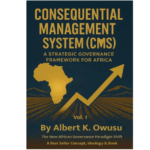
A World in Search of Accountability For decades, governments, corporations, and institutions across the globe have wrestled with one persistent challenge: how to build systems that truly deliver on their promises. Plans are announced, strategies are drafted, yet outcomes often fall short.
Accountability is too often diluted, and consequences—whether positive or negative—rarely align with actions taken.
This disconnect has left many leaders and citizens frustrated. In Africa especially, where governance has direct consequences for social stability, economic growth, and global competitiveness, the stakes could not be higher.
It is in this climate that a bold idea emerges: the Consequential Management System (CMS).
What is CMS?
The Consequential Management System (CMS) is more than a theory.
It is a strategic governance framework designed to close the persistent gap between intention and outcome. CMS insists that every decision, policy, or leadership action must be directly tied to measurable consequences. It establishes a culture where accountability is not optional, but structural.
Developed by thought leader Albert K. Owusu, CMS is articulated in his forthcoming book, Consequential Management System (CMS): A Strategic Governance Framework for Africa. The book positions CMS not as a mere management tool, but as a foundational requirement for true transformation in governance, leadership, and institutional culture.
Why Now?
The rise of CMS is timely. Across Africa and beyond, young populations are demanding transparency, results, and leadership integrity. Global investors are asking for reliable governance frameworks before committing resources. And leaders themselves are seeking approaches that can transform accountability from a vague aspiration into a daily practice.
CMS arrives not as another management fad, but as a consequence-driven system designed for a new era. It challenges leaders to rethink decision-making, policy implementation, and institutional culture through the lens of cause and effect.
From Framework to Movement
While CMS begins as a framework, its implications stretch far beyond management theory. At its core, it signals a shift in leadership philosophy: actions must always be tied to consequences, and leaders must be willing to embrace those consequences—good or bad.
As Albert K. Owusu puts it, “The power of leadership is not in the promises leaders make, but in the consequences they create.”
Setting the Stage for Transformation
Part 1 of this three-article series introduces the foundation of CMS: a bold reimagining of how accountability can be woven into the fabric of governance and organizational management.
In the coming articles, we will explore how CMS transforms organizations in practice (Part 2), and how it is evolving into a global movement, The Consequence Generation (Part 3).
From the forthcoming book, Consequential Management System (CMS): A Strategic Governance Framework for Africa, by Albert K. Owusu.